The process of handling invoices is a very time-consuming job that is often carried out incorrectly by businesses. It is important to note that manual work causes a lot of difficulties, such as delays, errors, and unnecessary trouble, especially in the textile sector of the industry,, which has a very complicated supply chain.
Electronic solutions for invoices are much faster and more efficient when it comes to handling invoices. With a complete shift from paper to digital storage, time is saved, the risk of error is minimized, and all records are located in one place. This is an adequate mechanism to ensure continuity of business operations and is instrumental in financial control. Therefore, an e-invoicing system is a boon.
As businesses undergo digital transformation, Malaysia's adoption for E-Invoice is becoming an integral part of the concept of digital transformation. Efficiency improvement is only part of the story. It is crucial to continue investing in new systems that will incorporate these key changes to keep pace with competitors and satisfy the needs and demands of the ever-changing world.
How Does E-Invoicing Support Malaysia's Digital Transformation?
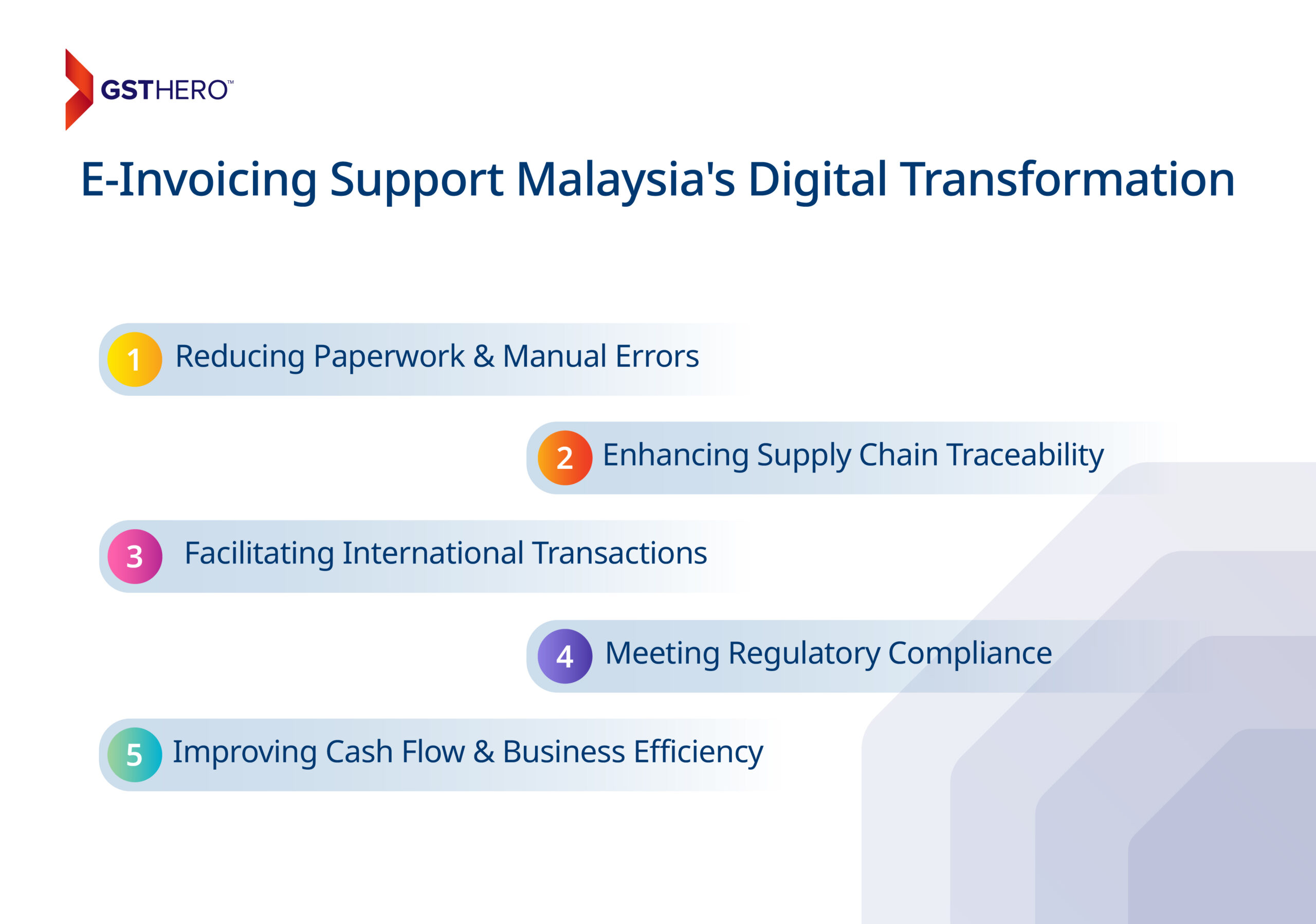
The process of invoicing or accounting for digital invoices is often referred to as e-invoicing technology. The use of EDI or Electronic Data Interchange in the e-invoicing system of the textile industry brings about substantial benefits such as:
- Elimination of Excessive Paperwork & Error : An automated invoicing is packed with a feature whereby human errors in the entire process are reduced; read, they become much less, eventually, almost nil, and all records are accurate and to the point.
- Enabling and Monitoring the Supply Chain : The use of digital invoices has made it easier to identify and locate raw materials, monitor manufacturing processes, and monitor shipments, especially in cases of more than two levels of the supply chain.
- Making International Transactions Less Of A Hassle : Given the global nature of the textile business, Peppol e-Invoicing streamlines cross-border trade, ensuring compliance with import/export regulations.
- Regulatory Compliance : Aligning with LHDN requirements ensures proper tax documentation and audit readiness. Businesses must follow e-Invoice specific guidelines to ensure their invoices meet legal standards.
- Improving Cash Flow & Business Efficiency – Quicker processing of invoices will lead to faster payments, better financial planning, and robust business relationships.
What Challenges Arise When Implementing E-Invoicing in the Textile Sector?
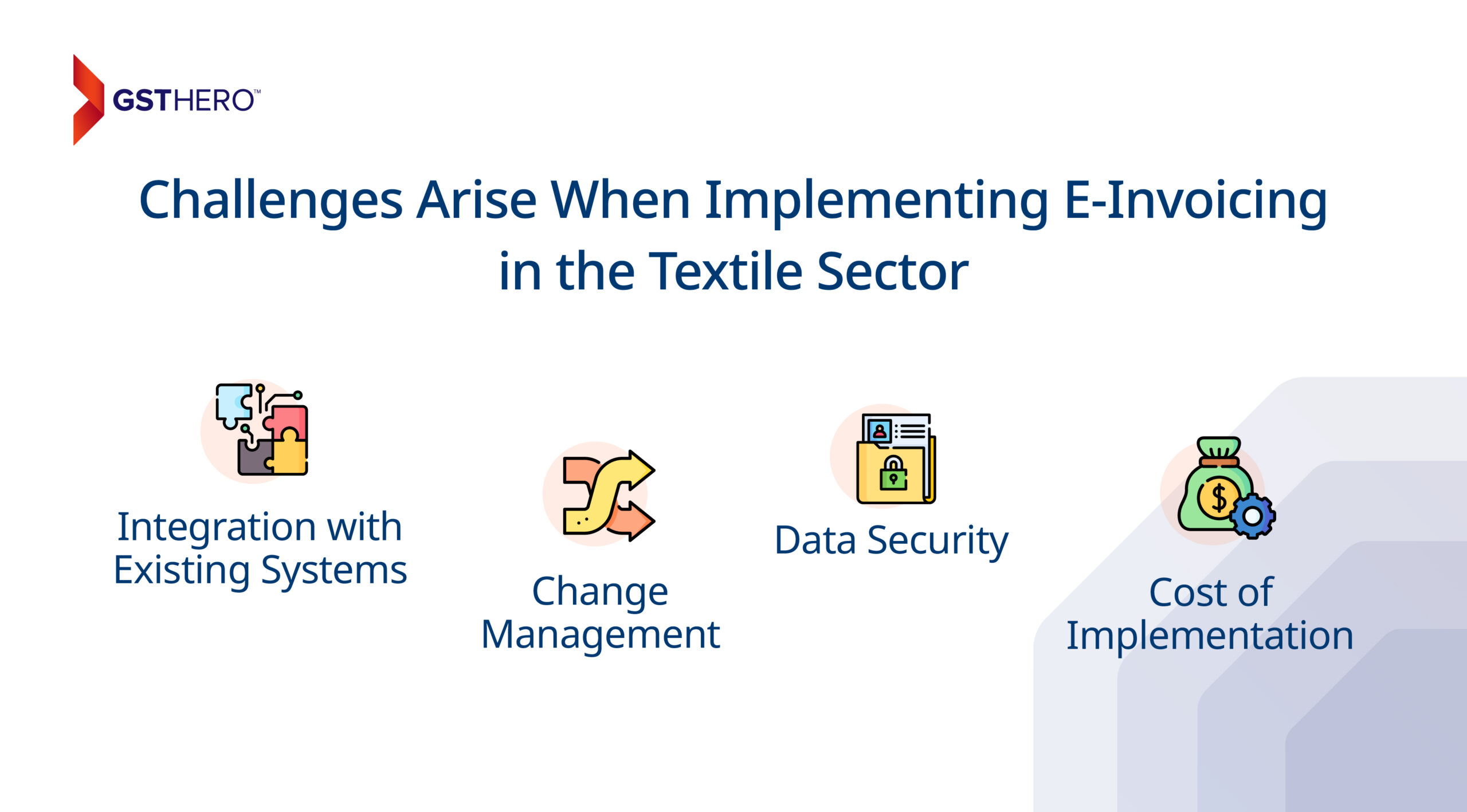
Despite its benefits, implementing an E-Invoice Solutions in the textile industry in Malaysia comes with several challenges:
- Integration with Existing Systems: Many textile companies rely on legacy systems that may not be compatible with modern e-invoicing Malaysia platforms, requiring significant upgrades or replacements.
- Change Management: Transitioning to digital systems for e-invoicing in Malaysia necessitates training staff and adjusting workflows, which can meet resistance and disrupt existing processes.
- Data Security: Protecting sensitive financial and business data is a top concern, particularly for companies involved in international trade. Ensuring secure data transmission is critical in e-invoicing Malaysia.
- Cost of Implementation: Although the long-term benefits of e-invoicing in Malaysia are substantial, the initial setup costs for implementing digital invoicing solutions can be a barrier, especially for small and medium enterprises (SMEs).
What Are the Advantages of E-Invoicing for the Textile Industry?
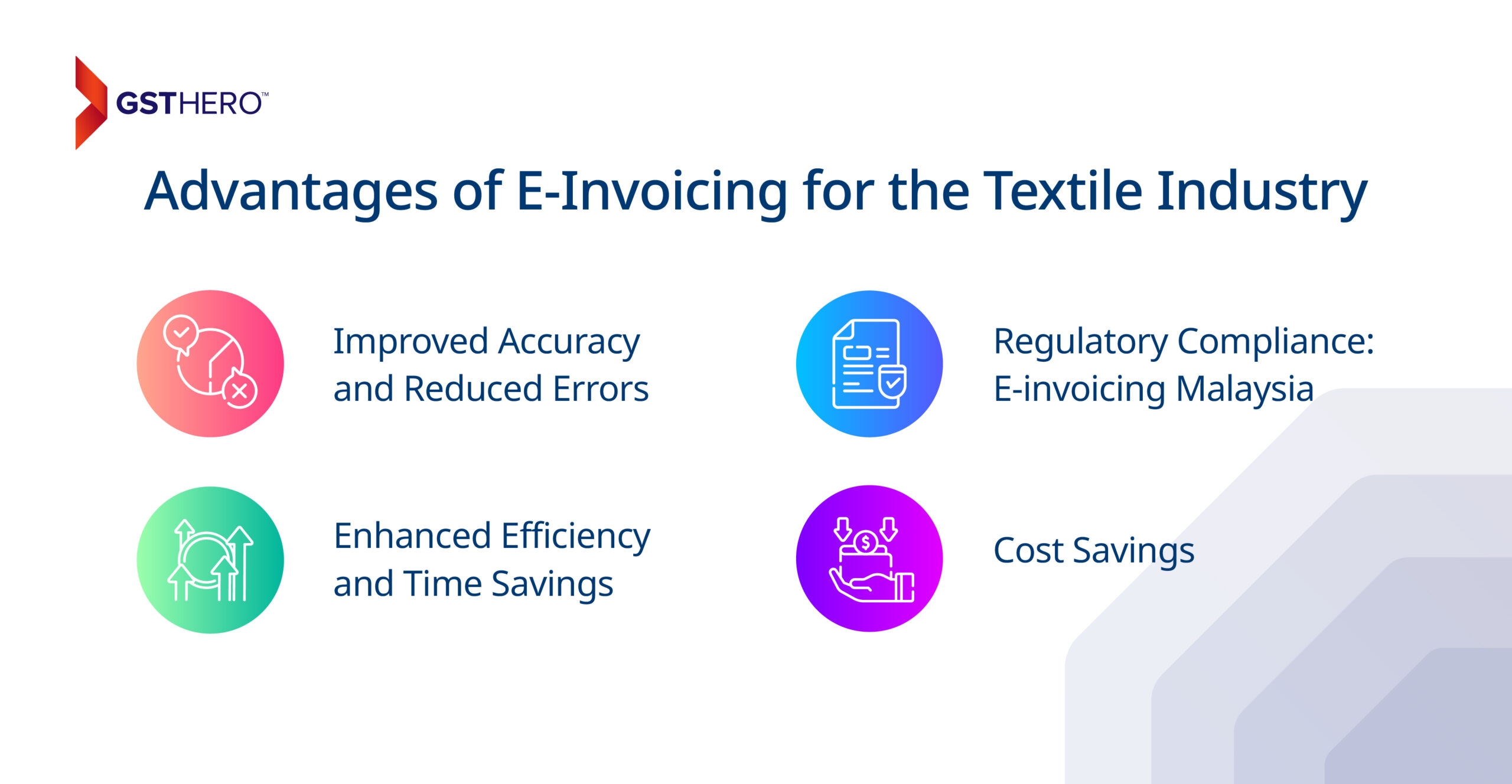
E-invoicing simplifies processes and boosts efficiency in the textile industry. It reduces errors, saves time, and ensures compliance with regulatory standards. Here are its key benefits:
- Improved Accuracy and Reduced Errors: Traditional invoicing processes often involve manual data entry and are prone to errors. E-invoicing Malaysia eliminates these issues by automating invoice generation, reducing discrepancies, and ensuring transaction accuracy.
- Enhanced Efficiency and Time Savings: By digitizing invoices, textile companies can save time on processing, approvals, and payment cycles. E-invoices are especially beneficial for industries like textiles, where timely payments to suppliers and vendors are critical.
- Regulatory Compliance: E-invoicing Malaysia ensures compliance with the country's tax and financial regulations, such as meeting the requirements set by the Royal Malaysian Customs Department. Automated systems also streamline audits and ensure smoother compliance.
- Cost Savings: Reducing paper usage, postage, and storage costs is another significant advantage of e-invoices. Digital invoices are not only eco-friendly but also cost-effective in the long run.
How Do You Choose the Best E-Invoicing Transmission Mechanism?
The Inland Revenue Board of Malaysia (IRBM) offers two primary e-invoicing transmission mechanisms:
MyInvois Portal:
Description: A user-friendly platform hosted by the IRBM, accessible to all taxpayers at no cost.
Ideal For: Small to medium-sized enterprises or those without advanced IT infrastructure.
Benefits: No financial investment is required; it is a straightforward interface suitable for businesses with lower transaction volumes.
Application Programming Interface (API):
Description: Allows direct data transmission between a company's and MyInvois systems.
Ideal For: Large enterprises with substantial transaction volumes and existing IT capabilities.
Benefits: Enables automation, reduces manual intervention, and integrates seamlessly with existing Enterprise Resource Planning (ERP) systems.
How Can Businesses Prepare for E-Invoicing Implementation?
Textile businesses should consider the following steps to ensure a successful transition to e-invoicing:
- Assess Current Systems: Evaluate existing invoicing processes and identify areas that require enhancement or modification to align with e-invoicing requirements. This will help ensure a smooth integration of e-invoice solutions.
- Invest in Technology: Upgrade or acquire the necessary software and hardware to support e-invoicing Malaysia. Ensure compatibility with the chosen transmission mechanism (MyInvois Portal or API) to facilitate seamless e-invoice processing.
- Staff Training: Conduct comprehensive training sessions to familiarize employees with new e-invoicing Malaysia procedures and systems. Emphasize the importance of accuracy and compliance in handling e-invoice data.
- Data Security Measures: Implement robust cybersecurity protocols to protect sensitive financial and business information associated with e-invoices. Regularly update systems to safeguard against potential threats.
- Continuous Monitoring and Support: Establish a support system to address technical issues promptly. Continuously monitor the e-invoicing process to identify and resolve any discrepancies or challenges, ensuring smooth operation of the e-invoice system.
What Are the Solutions for Successfully Implementing E-Invoicing?
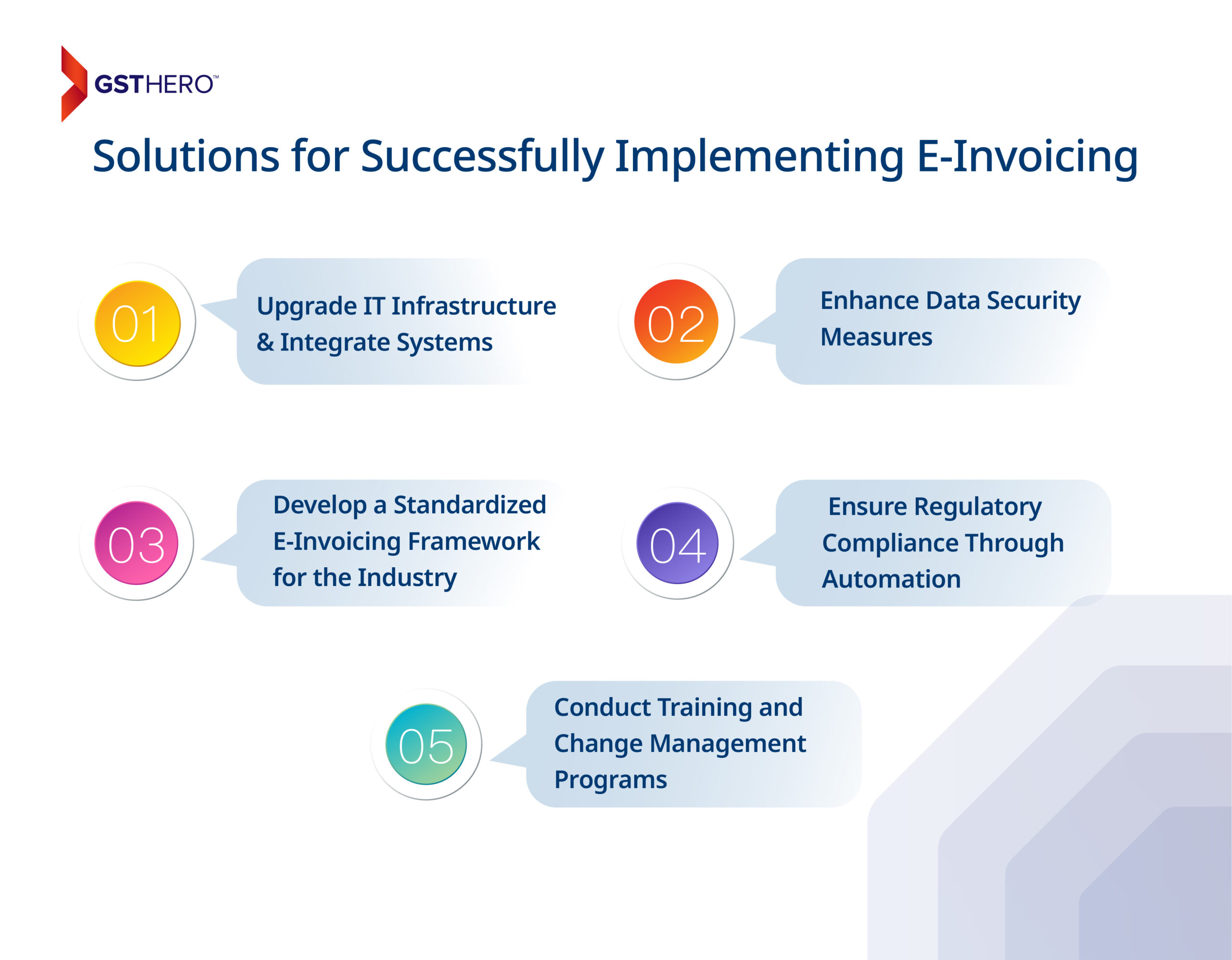
Implementing e-invoice solutions requires strategic planning and the right tools to ensure a seamless transition. By addressing key aspects such as technology, training, and security, businesses can set the foundation for successful adoption. Here are some practical solutions:
- Choose the Right E-Invoicing Solution: Select a platform tailored to the textile industry's unique needs. Look for features like multi-currency support, integration with ERP systems, and compliance with Malaysian regulations for e-invoice systems.
- Engage Stakeholders: Involve all relevant stakeholders, from finance teams to IT staff, in the planning and implementation. It will ensure a smoother transition and higher adoption rates for the e-invoice system.
- Provide Training and Support: Equip employees with the necessary training to use the e-invoicing system effectively. Offer ongoing support to address technical issues or concerns during and after the transition.
- Ensure Data Security: Work with trusted providers that offer robust security measures, such as encryption, access controls, and compliance with data protection laws like Malaysia's Personal Data Protection Act (PDPA) to protect e-invoice data.
- Pilot the System: Before full-scale implementation, run a pilot program to identify potential issues and fine-tune the e-invoice system for optimal performance and smoother operation.
How GSTHero Transforms E-Invoicing for the Textile Industry
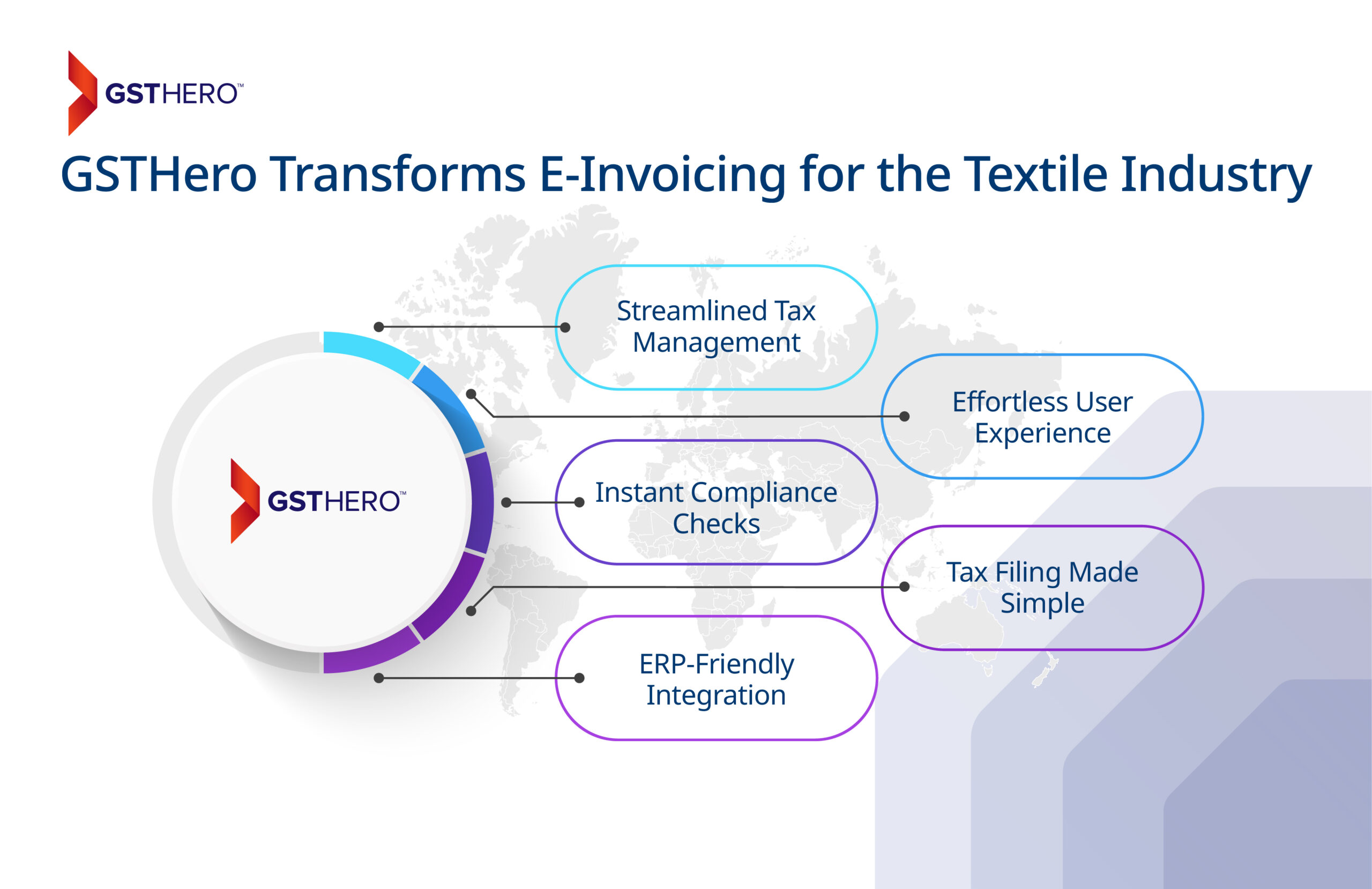
As the textile sector embraces digitalization, GSTHero stands out as a game-changing tool that enhances the efficiency of e-invoicing processes while ensuring seamless compliance with Malaysia's tax regulations. Here's how it redefines e-invoicing for textile businesses:
- Streamlined Tax Management: The platform eliminates the complexity of calculating and managing GST with automation, ensuring that every transaction is accurately processed according to the latest e-invoice specific guideline.
- Instant Compliance Checks: GSTHero performs real-time validations, ensuring that businesses are always assured of their invoicing being compliant, helping to avoid costly penalties or errors.
- ERP-Friendly Integration: The system effortlessly integrates with existing ERP systems, allowing for a smooth transition and continuous synchronization of invoicing data across departments.
- Effortless User Experience: Its platform minimizes the learning curve for employees, enabling them to adopt the system quickly without extensive training.
- Tax Filing Made Simple: GSTHero simplifies preparing and filing GST returns, reducing administrative burdens and ensuring businesses stay ahead of deadlines.
Future Outlook: E-Invoicing and Beyond
As Malaysia advances digitalization, e-invoicing is set to become a standard practice across industries. For the textile sector, adopting this technology ensures compliance with regulatory requirements and offers a significant competitive edge in the global market.
By investing in e-invoicing solutions today, textile companies in Malaysia can pave the way for a more sustainable and efficient future. This transition enhances transparency, streamlines operations, and positions businesses to thrive in a rapidly evolving digital economy.
Conclusion
Implementing e-invoicing solutions is crucial for Malaysia's textile industry to stay competitive in an increasingly digital world. The transition offers significant benefits, from cost savings to enhanced regulatory compliance, making it both a necessity and an opportunity for growth.
By addressing challenges through strategic planning and leveraging the right tools, textile companies can fully realize the potential of e-invoicing. This shift streamlines operations and lays the foundation for long-term success in a fast-evolving global market.
FAQ On Textile Industry E-Invoicing Implementations Solutions in Malaysia
Yes, e-invoicing is gradually being made mandatory in Malaysia as part of the government's Digital Economy Blueprint and MyDigital initiatives. The implementation will occur in phases based on company size and annual turnover.
E-invoices in Malaysia must follow a standardized digital format prescribed by the Inland Revenue Board of Malaysia (IRBM). This format ensures compliance with tax rules and includes key details like invoice number, supplier and buyer information, GST details, and total payable amounts.
Businesses are typically given a grace period during the phased rollout of e-invoicing. The exact timeline and grace period vary based on the size and turnover of the company, with SMEs often receiving additional time to comply.
An invoice in Malaysia must include the supplier's and buyer's names, addresses, tax registration numbers, and the invoice date and number. It should also describe goods or services, quantity, unit price, GST amount (if applicable), and the total payable amount.
The new rules mandate the adoption of e-invoicing for tax compliance. Businesses must issue and receive invoices electronically, adhere to IRBM-approved formats, and ensure that their systems are compatible with MyInvois Portal or API-based transmission mechanisms.
E-invoicing was officially announced in Malaysia in 2022 as part of the government's efforts to promote transparency, improve tax compliance, and accelerate the country's digital transformation.
E-invoicing was officially announced in Malaysia in 2022 as part of the government's efforts to promote transparency, improve tax compliance, and accelerate the country's digital transformation.
Micro-businesses and entities with low annual turnover may be exempted from mandatory e-invoicing. Specific exemptions will depend on IRBM guidelines, which consider company size and nature of operations.
Several countries are implementing e-invoicing, including Italy, India, Indonesia, Mexico, and Brazil. Each country has regulations and frameworks for adopting e-invoicing to improve tax compliance and operational efficiency.
All businesses operating in Malaysia are expected to transition to e-invoicing as per the government's phased rollout plan. Eligibility and timelines depend on the company's annual turnover, with larger companies required to comply earlier than SMEs.
Certain industries, such as real estate, typically cannot issue consolidated e-invoice Malaysia, as they involve high-value, single transactions.
The impact of e-invoicing in Malaysia includes improved transparency, reduced tax evasion, and greater operational efficiency.
